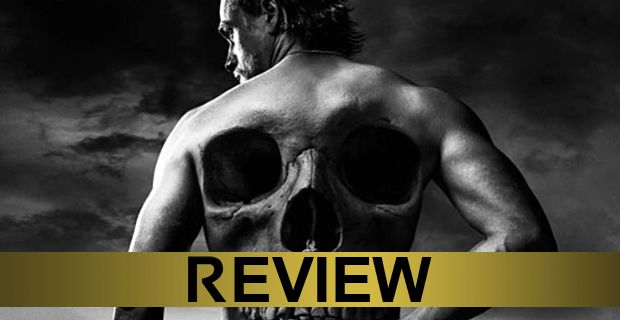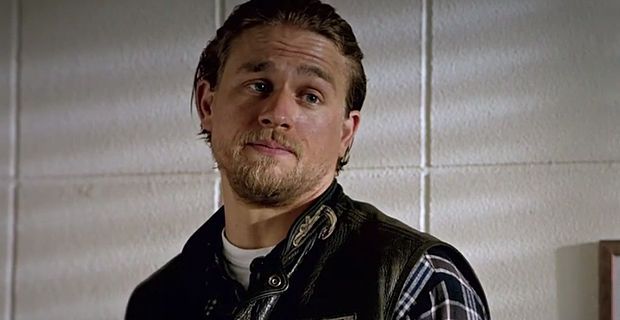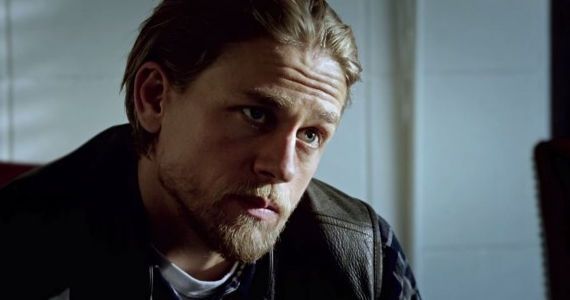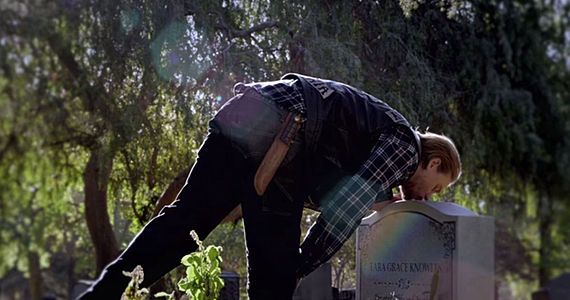[This is a review of Sons of Anarchy season 7, episode 13. There will be SPOILERS.]
-
There comes a time in the lifespan of every television show when there's just nothing left to say. That's true on both sides of sides of the screen. At a certain point, it can feel like the series (and the audience) is simply riding up and down the same desolate stretch of asphalt. After a while, the comforting familiarity of the scenery no longer captivates like it once did, and the only thing left to do is wait for an eighteen-wheeler to come barreling down the road in the opposite direction. When that happens, it's time to start wrapping up loose ends and nudging the narrative toward an end point.
For the last few seasons, it's certainly felt as though Sons of Anarchy has been travelling up and down that same highway, just biding its time until an inevitable collision brought it all to a close. Much of that has to do with the way the central narrative was structured. One way or another, Jax was going to be embroiled in a confrontation with his wicked stepfather, his duplicitous mother, and, eventually, himself. The only question was: when?
The promise of those confrontations were the show's lifeblood; they were the element that kept people hanging on, even through the increasingly complicated and convoluted plot machinations that prevented them from coming to fruition. The show had only one very clear endgame in mind, and each consecutive season began to feel less like the progression of a story, and more like a temporary stay of execution. As a result, the razor-sharp edge that ostensibly defined the series – particularly in its first and second seasons – was blunted. When it came time for Ron Perlman's Clay Morrow to finally meet his end, as he did last season, the sharpness of the moment was noticeably dulled. A mixture of inevitability and the show's heavy reliance on surprise plot reversals had robbed the moment of much of its potency.
There was a similar feeling of inevitability during last week's penultimate 'Red Rose'. With Gemma and Juice both resigning themselves to their violent deaths, after eleven episodes of doing nearly everything in their power to avoid reaching that end, the sense of weary inexorableness had a downright meta-textual layer to it. And so, with Gemma turning a paler shade of gray among all the blood-spattered white roses in her childhood garden, it makes sense that the series finale, 'Papa's Goods' would borrow that particular feeling of inescapability, as Jax Teller met each loose end with a knowing, almost peaceful smile.
In a sense, the series finale was very workman like: it was all about getting the job done. The episode was even a shade more concise than what's come before (especially after last week's pre-commercial 80-minute runtime), which, although it was still in need of an editor, helped give it a more compelling sense of finality. That's saying something considering it was nearly two hours of Jax jumping from unresolved plot point to unresolved plot point, making sure he put his stamp of approval on lingering issues like the IRA, Charlie Barosky and August Marks.
Those moments were mercifully brief. If there's anything the characters on Sons of Anarchy like to do, it's to tell other characters what they already know. But in 'Papa's Goods', those expected moments of exposition were replaced with Jax's silent, furious efficiency. The image of the indecisive Dane he was modeled after was tossed aside for something far swifter and conclusive. And even though he was mostly sweeping up after last week's party, Jax was suddenly filled with more vitality than he'd been in years. It was as though the character had finally caught up with plot. All the double-crossing and the eleventh hour saves that had become the narrative's primary obstacles had been swept aside. At long last, Jackson Teller was able to see what would happen when the crow could finally fly straight.
With the lingering inevitability of the mayhem vote Jax was facing, and the aforementioned peaceful, doe-eyed look Charlie Hunnam wore throughout much of the episode, the finale had the unenviable task of finding tension within a story where the protagonist had already resigned himself to his fate. Jax's mournful serenity painted most of his scenes with a sense of forbearance that thankfully prevented them from devolving into histrionics. The fact that Gemma wasn't around likely helped with that issue, too. As with the previous two episodes, Hunnam and Smits were great together. Each actor walked right up to the melodramatic edge, but resisted the urge to go over completely, and the result was some of the most convincing and heartfelt drama in the series. Of all the characters the show needed to arrive at the same sense of peace and purpose as Jax, it was the farm-bound Nero; and to the episode's credit, it delivered that feeling in persuasive style.
Perhaps unsurprisingly, in order for the rest of SAMCRO to arrive at the same place, the finale had to engage in one last dramatic reversal. After the club took a mayhem vote, it seemed like Jax's brothers would be reluctantly giving him away to walk into oblivion with the reaper. That didn't happen, of course, as the club couldn't resist the allure of another double-cross – for which Happy wound up taking a bullet to the forearm. The reveal weakens much of the episode's structure upon second glance – especially the club's tear-filled mayhem vote – but it results in Chibs, Tig, and the rest of the club having the chance to close things out with the promise of moving on without the weight of Jax's death on their shoulders.
The poor truck driver played by Michael Chiklis on the other hand? Not so lucky. The final montage that was coupled with the literal final ride of the series was every inevitable moment rolled into one. If one could choose a single thing to say about it, it would be that this without a doubt felt like Kurt Sutter's vision for his series and he definitely brought it to a close without compromise. And although that uncompromised sense of closure came with the literally and figuratively threadbare arrival of the homeless woman who had long foreshadowed death (and the unnecessary lingering shots of bread and wine), it felt as though there was no question this was the unfiltered vision of the show's creator.
The road may have gone on too long for some, but for the loyal fans that remained enthralled until the very end, it would be hard to imaging the ending didn't leave them feeling fulfilled.




